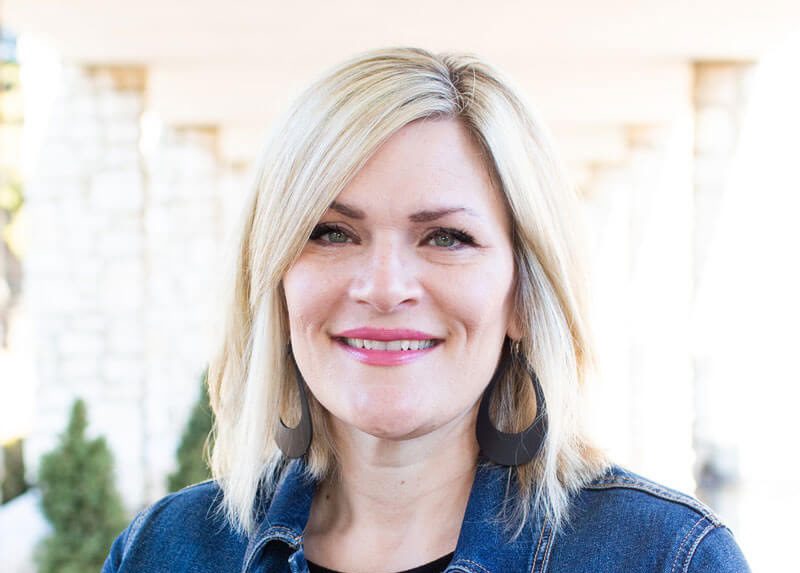
Angela C. Swain
Associate Professor of Music, Director of Voices of Midwestern, Director of North Oak Collective
At a Glance
Biography
Angela C. Swain serves as Associate Professor of Music in the Department of Worship Ministries and is the co-founder and director of both the Voices of Midwestern Choir and the North Oak Collective chapel worship team. Together, she and her husband, Dr. Matthew Swain (Dean of Worship Ministries), strive to faithfully prepare musician-theologians for the Church. Angela’s primary role in the process is one of developing strong practitioners for ministry through overseeing, discipling, and rehearsing music students as they grow in their personal musicianship and develop strong music-leadership skills.
She holds degrees in instrumental and vocal music education from the University of the Cumberlands in Williamsburg, Kentucky where she majored in saxophone and voice with a minor in piano and percussion. She also holds a Master of Music degree (with additional theological and church music studies), along with her post-graduate studies toward a Doctorate in Musical Arts, from the Southern Baptist Theological Seminary in Louisville, Kentucky – a degree interrupted by the welcomed and cherished ministry of motherhood.
Additionally, Professor Swain holds and maintains valid teaching certifications in two states (earning Missouri’s life-time certification), and she comes to the seminary’s classroom and rehearsal spaces with over 30 years of experience as a music educator, a band director, and a choral director—all from a variety of settings which includes the university level and K-12 public schools, performing-arts schools, and Christian school settings.
Angela’s ministry experience is diverse and extensive and includes both part time and full-time church staff positions—serving in both worship and women’s ministries. More broadly, it includes the role of state music & worship consultant for the Kentucky Baptist Convention along with leading worship and teaching break-out sessions for various worship conferences or women’s ministry events across the United States.
On a personal note, Professor Swain enjoys discipling women on Midwestern’s campus while cherishing off-campus opportunities including invitations to speak on topics (and to be a guest on podcasts) related to hymnody, Church history, women in ministry, female hymn writers, Christian education, classroom management, and motherhood. Hailing from foothills of southern Virginia, between the Blue Ridge and Smoky Mountains, she possesses the ability to speak and interpret the two very distinct languages of “hillbilly” and “southern drawl.” Her family roots extend into the hollers and cultures of East Tennessee, the Carolinas, and Georgia, which also provide the source for her family recipes, her penchant for bluegrass, and her parenting style!
She is a happy dog-mom to Brownie & Frank and the extremely proud mother of John-Franklin and Olivia – snuggling with the former and cheering on the latter during their many basketball, baseball, volleyball games, and musical performances. In her downtime, she enjoys lovely British television shows and rousing episodes of Judge Judy.
Education
Bachelor of Music Education in Instrumental and Vocal Music, University of the Cumberlands
Master of Music, The Southern Baptist Theological Seminary
Postgraduate Studies for Doctorate in Musical Arts, The Southern Baptist Theological Seminary
Faculty Q&A
This vision has funneled our unique mission and has become an intentional part of our core convictions in how we strategically develop and disciple, what we refer to as, “musician-theologians” for the Church.
In my combined experiences of having been a music & worship student in an SBC seminary and also being on staff at many churches or state conventions, I know that similar institutions have gone back and forth on their methodology of training the next generation of music leaders for corporate worship.
A lot could be said here, but most succinctly is to say that while many emphasize a focus on theology of Biblical worship they simultaneously diminish any practical training of music. Similarly, other institutions do the exact opposite — focusing mostly on the practical musical training with very little Biblical theology or ministerial skills. I can testify that the “for the church” mission stops the pendulum swing of these preparation variables and beautifully provides our program with a balanced conviction through which we filter all the “what ifs” and create streamlined yet balanced approach.
In fact, all of our degree offerings, from undergrad to the doctorate, offer this balance in that we do not apologize for developing better musicians (God is the very good author of these incredible and unavoidable practical skills). Still, we do not merely want to improve their individual musicianship, but also help individual musicians understand and obtain skills related to the unavoidably comprehensive nature of the those needed to develop the musicians and musical teams at their local church. We want them to experience what they’ve potentially lacked — from reading, composing, and arranging music and becoming better musicians and artists, themselves (to the glory of God!), to learning about choir or orchestral instruments, hymnody, the history of Church music, rehearsal techniques and so much more.
Much has been tossed out in worship ministry over the decades in direct proportion to the musician’s understanding (or lack of) the musical culture in which they are serving and the instruments or ensembles which have served that culture.
Most importantly, this balanced approach, filtered through the “for the church” mission helps us skip the fray and focus only on what stands to serve the local Church. While there are many noble things to learn and do to serve the Church, universal, our one-of-a-kind mission is to steward our budget of money, of academic hours, and of equipping and discipleship to help students know more and be better prepared for Sunday mornings — for corporate worship in the local Church.
Lastly, our mission is made more unique in that we do not train “worship leaders.” We do, actually, but we don’t say it that way. It’s more than terminology, as well. By training “musicians” and “theologians” (musician-theologians), we are fitting each student in his or her Biblical role and calling to serve the Body of Christ in whatever manner the local Church needs or desires. From training worship pastors or song leaders to children’s church choir leaders, Christian school music teachers, or worship ministry administrators (and everything in between), our mission is to equip them with the diverse skills needed for local church ministry, to develop their understanding of what it takes to serve, and to deepen their passion for discipling those with whom they lead or serve alongside.
Uniquely, they’ll learn from professors and instructional faculty who, themselves, are for the Church. Our music faculty have professional music degrees, have SBC seminary degrees, and are faithfully serving in the local congregations. This is discipleship in the making. From classroom instruction to fire-side fellowships in our own backyards, our mission is to pour our lives into the next generation of musician, for the Church.
What I love about teaching here is more than simply enjoying the fulfillment I receive from completing a mission for which the Lord has uniquely created me; it’s also about the sense of belonging and the sense of family I feel among the student body and also among the faculty.
I love walking into the cafeteria and being greeting by so many precious students who I’ve come to know over the semesters. While our campus is not a local Church, it certainly is made up of the Bride of Christ and can feel like a Church. I love seeing students develop friendships. I love receiving wedding invitations or baby shower announcements or invites to hang with some of our single female students over coffee or lunch at Panera. And while it’s certainly much more difficult, I also enjoy the challenging times when students need our attention because of a difficult academic or personal matter. That’s a part of loving them as the Church and passing along the baton of ministry to them through various forms of discipleship.
Likewise, this campus is filled with faculty and staff members who’ve become close friends over the many years of working together. In many cases, even their children have become life-long friends with my own. From the early years when my child (with another faculty member’s child) would raid a faculty meeting for ice-cream (with toy cap-guns and cowboy hats in tow) to the days of watching them hang with college students at the annual campus’ picnic, I love that our story is now an integral part of what God is doing in them.
Whether the faculty are floating in the Dead Sea together, (on a recent faculty trip to Israel), or having salad together (I often meet with other female faculty for fellowship), or enjoying laughter in meetings or singing together during the Christmas concert, our sense of family makes for a story of belonging that only the Lord can write. I think our students sense this, as well. They see our human frailty, too, of course — even my own moments of frustration or disappointment. And hopefully we all model well what it’s like to be broken and to live out our messy lives and ministries in communion with other Believers in a way that honors the Lord. That’s the beauty of campus life!
I love seeing many of our recent worship ministry graduates flourishing in their ministries. From Dakota Unruh at FBC in Enid, Oklahoma and Tyler Bridges in St. Joe, Missouri, to Travis Black at FBC Kearney, MO and Clint Stevens at Antioch Baptist here in Kansas City — these examples, along with so many others, represent the best of what is taking place here. They live out their ministry callings with wisdom, humility, grace, and expertise. Additionally, we are continuing to see an annual influx of young students who enter our programs as mature followers of Jesus — taking seriously their call to ministry (in various forms) and who also display humility, especially as they discipline themselves to learn “all the things” and as they trust the training process, obediently following God’s call to prepare for service.
I am especially encouraged to see the spiritual maturity and the willingness to serve among our incoming undergraduate students, in particular. While each one enters with his or her own unique musical experiences and abilities as well as their own worship experiences from their home Church, each one maintains a willingness to learn new things and to do hard things. From developing new life skills away from home for the first time to learning new songs or hymns or taking music theory courses that cause them to question their decision (giggles!), the resolve and determination this next generation displays continually encourages me. It also makes me thankful for the homes from which they’ve come and to take delight in the person they are becoming. I can hardly wait to launch them, although it will be hard to lose them.
Church, there are great followers of Christ who are developing their personal and ministerial music skills for you! Be praying for them. Find ways to support them, even now.
